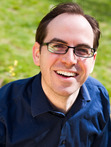Adam Szymkowicz's Blog, page 3
December 5, 2022
I Interview Playwrights Part 1116: Julia B. Rosenblatt
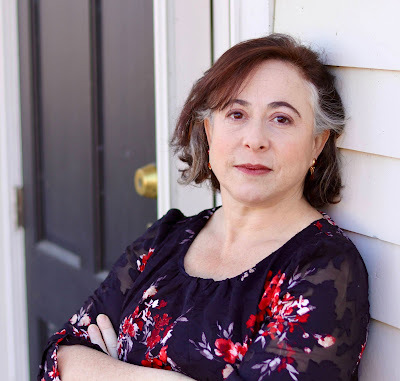
Photo Credit:Seina Shirakura Photography
Julia B. Rosenblatt
Hometown: Hartford, CT
Current Town: Back in Hartford!
Q: Tell me about Can't Make This Sh*t Up
A: About two months ago Tjasa Ferme introduced me to Transforma Theatre and The Science in Theater Festival. While I believe in science thoroughly, (which is actually something one has to make explicit these days), I am terrifyingly intimidated by the subject. My freeze response kicks in and I assume I am incapable of understanding any of it. So when Tjasa said she needed a play about an eco-toilet connected to a laboratory that uses excrement to produce biogas, my head started spinning.
Jaewon Cho's BeeVi toilet is nothing short of mind blowing. And yet it makes so much sense, I can only assume the reason we haven't heard more about it, is that it involves acknowledging what the great children's author, Taro Gomi, has been telling us for decades: everyone poops. As we get closer to the point irreversible climate change, it's clearly time we get over ourselves and insist on sustainable forms of energy, no matter what (or whom) it comes from. Can't Make This Sh*t Up, is loosely based on my home, a small urban commune once known as the Scarborough 11. The play imagines the year is 2030. After yet another devastating natural disaster has wiped out the city's plumbing and sewage system, we decide to build a Biological Anaerobic Digestion System in our backyard. Our NIMBY neighbors go nuts, and drag us before the zoning commission, bringing national attention to our family once again. It's a comedy.
Q: What else are you working on now?
A: Group! (lyrics by Eloise Govedare, music by Aleksandra Weil) is a musical that follows six women through intensive outpatient therapy for drug and alcohol addiction. The show has had two workshops and a brief run at Passage Theatre in New Jersey. We are now in the process of rewrites, and looking for the next development opportunity.
Q: Tell me, if you will, a story from your childhood that explains who you are as a writer or as a
person.
A: Like many other playwrights, I have been "devising theater" in my parents' basement since I was in elementary school. I spent hours creating and rehearsing epic plays and musicals with anyone who was willing (most often my younger sister). I am eternally grateful to my parents, older sisters, aunts and uncles for sitting through our "performances."
Q: If you could change one thing about theater, what would it be?
A: Purpose and access. Theater is essential to the human condition. It should not be something that is elite or reserved for specific times and places. Theater should be made and enjoyed by whomever chooses to do so.
Q: Who are or were your theatrical heroes?
A: August Boal's Theater of the Oppressed changed my life. It set me on a path that I have rarely veered from in the last 30 years. As far as current playwrights, I fall in love with everything Lynn Nottage creates.
Q: What kind of theater excites you?
A: Real, complex stories that use humor to challenge the status quo and demand systemic change.
Q: What advice do you have for playwrights just starting out?
A: Oof, this is a hard one because every day I feel like I'm "just starting out." I guess I would say write with passion and seek feedback with humility. We should always be learning.
Q: Plugs, please:
A: Well of course coming up, Science in Theater Festival.
I am a co-founder and ensemble member of HartBeat Ensemble.
Check out the professionally immersive theater training program at Capital Community College!
---------------------------------------------------------------------------------------------------------
Enter Your Email To Have New Blog Posts Sent To You
-----------------------------------------------------------------------------------------------------------
Support The Blog
 -----------------------------------------------------------------------------------------------------------
-----------------------------------------------------------------------------------------------------------Mailing list to be invited to Adam's events Email: ------------------------------------------------------------------------------------------------------------Adam's Patreon
Adam's New Play Exchange Profile (Plays to Read)
Books by Adam (Amazon)
Published on December 05, 2022 11:11
November 15, 2022
I Interview Playwrights Part 1115: TyLie Shider
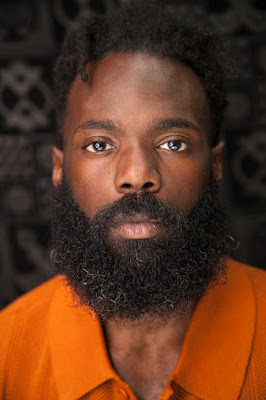
TyLie Shider
Hometown: Plainfield, New Jersey
Current Town: Minneapolis, Minnesota
Q: Tell me about The Gospel Woman.
A: The Gospel Woman is a traditional American family drama set in a 1970’s Baptist church. It’s a kind of tribute play that I built around a gospel record my mother recorded when she was a teenager. Lastly, it’s the 2nd installment in my “Mom & Pop plays,” which are a set of companion plays that I wrote based on the original music my parents recorded growing up. I wanted to concretize and honor their ambition, because their ambition led to my professional ambition. My father is a guitarist and singer, and my mother is a gospel singer. They are both songwriters. And I started writing creatively by watching them work and imitating them. The plays are set 5 years apart, and set against the backdrop of transformative moments in American history. The first installment, Certain Aspects of Conflict in the Negro Family, is set in the “long hot summer of 1967” when uprisings broke out across the country. And the second play, The Gospel Woman (NBT), is set in 1972, and it explores what happened to my hometown, Plainfield, NJ, after the riots. Both of the plays are family dramas that center two very different families in the same city. However, I call the plays “Rehearsal Dramas” because I grew up in recording studios and backstage at my parents’ concerts, and the rehearsal atmosphere is the soundtrack to my childhood.
Q: What else are you working on now?
A: The next play I am working on is called Whittier. It’s a contemporary docudrama I am developing at the Playwrights’ Center based on interviews I conducted during the 2020 uprisings in my neighborhood in Whittier, Minneapolis.
Q: Tell me, if you will, a story from your childhood that explains who you are as a writer or as a
person.
A: I was always interested in writing down the stories around me. My mother owned a hair salon when I was growing up, and she gave me an opportunity to create a “newsstand” in her salon where I would sell newsletters I had written on saturdays. The newsletters were basically comic strips which featured adaptations of her clients' conversations.
Q: If you could change one thing about theater, what would it be?
A: I’d like to see more revivals of American classics. I was very excited to see Alice Childress’ Trouble in Mind on Broadway!
Q: Who are or were your theatrical heroes?
A: August Wilson is one of my literary heroes. Also I had an opportunity to study with in graduate school at Tisch, Anna Deavere Smith and her course really validated my investigative esthetic.
Q: What kind of theater excites you?
A: Quarantine deepened my appreciation for live theater. It’s become a privilege to congregate with people in the same room. Therefore, any opportunity to see live theater outside of the “metaverse” excites me.
Q: What advice do you have for playwrights just starting out?
A: I think writers should study the biography and careers of other writers.
Q: Plugs, please: My play Whittier is part of the Playwrights’ Centers’ public season next month.
Check it out in person or online.
A: In person: Monday, December 5, and Tuesday, December 6 at 7:00 p.m. Available online:
Thursday, December 15 – Wednesday, Dec 21, 2022
---------------------------------------------------------------------------------------------------------
Enter Your Email To Have New Blog Posts Sent To You
-----------------------------------------------------------------------------------------------------------
Support The Blog
 -----------------------------------------------------------------------------------------------------------
-----------------------------------------------------------------------------------------------------------Mailing list to be invited to Adam's events Email: ------------------------------------------------------------------------------------------------------------Adam's Patreon
Adam's New Play Exchange Profile (Plays to Read)
Books by Adam (Amazon)
Published on November 15, 2022 08:26
October 3, 2022
I Interview Playwrights Part 1114: Emma Goldman-Sherman
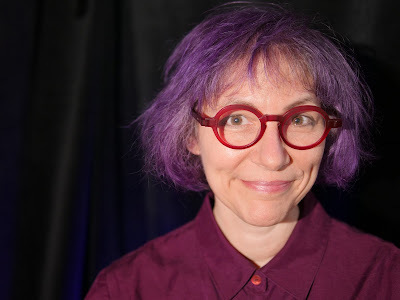
photo by Melinda Hall @snappynyc
Emma Goldman-Sherman
Hometown: Philadelphia, PA
Current Town: New York City
Q: Tell me about FUKT.
A: FUKT was written in a few days from a prompt from Aaron Sawyer when he was the AD at Red Theater Chicago and ran the Write a Play a Day for the month of November back in 2017. For anyone who has forgotten what happened in October of 2017, a lot of women came forward in the news with histories of sexual abuse, and the world questioned their veracity.
I like to write fast, especially hard material, and then revise slowly. I think it's important to get to the end of the arc and then figure out what's missing. It feels more honest, unconscious and unplanned. The prompt was "Self as Villain, No 4th Wall." Most of the play just fell into my head the minute I opened the prompt on October 31st. The first reading was November 9th at the Dramatists Guild Foundation with the 29th Street Playwrights Collective. I was afraid if I didn't get it into the world in front of some colleagues, I would hide it away forever.
FUKT is a dark comedy about my own personal journey healing from traumatic memories. It's meta and immersive. It sits between Slave Play and What the Constitution... I developed it with New Circle Theatre Co and Dixon Place. I appreciate all the love it gets on NPX. FUKT was a finalist with BAPF and Unicorn. I'm producing it at The Tank in NYC this fall. It will live-stream and be live in person. So anyone can have access. October 27 - November 13th.
Q: What else are you working on now?
A: I'm working on a commission from Experimental Bitch about the history of medical misogyny. Tanya's Lit Clit is a phantasmagorical musical - a comedy with ballet and burlesque - about autoimmune disease and how women, especially Black women, are mistrusted by the medical establishment. I'm also working with EmptyRoomRadio.com on Tamar (The Two-Gated City) about raper culture in the Bible, in particular about a woman who isn't heard in court.
Q: Tell me, if you will, a story from your childhood that explains who you are as a writer or as a person.
A: I fell in love with theatre early. As an abused autistic child with chronic illness, I took everything literally. So when I saw TinkerBell healed from collective applause, I realized, and fully believed, and still believe today, that theatre holds a kind of magic that gives audiences agency to create our own transformations. I had to find a way to do that.
Q: If you could change one thing about theater, what would it be?
A: Access! Who gets to tell the stories that create the culture we live in? Who gets to decide who gets to tell these stories? I am part of a lost generation of women who are never taken seriously by the gatekeepers. Lit managers look right past me. It's extremely disheartening. I'm a member of the advocacy organization Honor Roll! to try to change how older female artists are seen. If a theatre takes public funds, it should have a mandate to represent the lived experiences of its public. Why must we watch the same revivals over and over again? How does that provoke change?
Q: Who are or were your theatrical heroes?
A: too many
Q: What kind of theater excites you?
A: I love theatre that is conscious of its audience. We have enough walls and screens between us.
Q: What advice do you have for playwrights just starting out?
A: Find a supportive community! Join me in www.BraveSpace.online
Q: Plugs, please:
A:
MORE ABOUT FUKT: https://www.fukttheplay.com/
GET FUKT TICKETS: https://ci.ovationtix.com/35658/production/1138125More about Brave Space https://www.bravespace.online
---------------------------------------------------------------------------------------------------------
Enter Your Email To Have New Blog Posts Sent To You
-----------------------------------------------------------------------------------------------------------
Support The Blog
 -----------------------------------------------------------------------------------------------------------
-----------------------------------------------------------------------------------------------------------Mailing list to be invited to Adam's events Email: ------------------------------------------------------------------------------------------------------------Adam's Patreon
Adam's New Play Exchange Profile (Plays to Read)
Books by Adam (Amazon)
Published on October 03, 2022 10:52
July 26, 2022
90 New Monologues
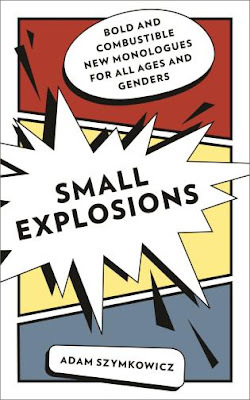
I tried writing some new things the last couple of years. The jury is still out on what will happen to the YA novels I wrote. But another thing I tried was writing new monologues. For about three months last summer I wrote a monologue most days in the morning.
Most of my plays have monologues in them and there has been a steep uptick in the past five years in the number of actors doing my monologues in auditions and acting classes.
I thought I would lean into it and put even more monologues in the world. So I wrote these 60 monologues and I sent it to applause and they liked it and asked me to write some more. And I did. So now there are 90 or so monologues collected in a book coming out in early 2023.
And it is now available for preorder. So maybe you know an actor or an acting teacher who would like it. Maybe you could ask your local library for it. Maybe you could buy a bunch of copies and donate them to a theater program.
Anyway, pitch over. I'm super happy about this and proud of it and glad it worked out. If applause said no, there aren't a lot of other publishers of monologues, so I'm feeling very lucky. And I'm sure this isn't a moneymaking endeavor. It's the theater person's version of writing a bunch of poems. So more than anything it feels like I wrote this gift for you. (Although the book does cost money.) But I think you'll like it. And I love the cover.
---------------------------------------------------------------------------------------------------------
Enter Your Email To Have New Blog Posts Sent To You
-----------------------------------------------------------------------------------------------------------
Support The Blog
 -----------------------------------------------------------------------------------------------------------
-----------------------------------------------------------------------------------------------------------Mailing list to be invited to Adam's events Email: ------------------------------------------------------------------------------------------------------------Adam's Patreon
Adam's New Play Exchange Profile (Plays to Read)
Books by Adam (Amazon)
Published on July 26, 2022 13:35
July 7, 2022
I Interview Playwrights Part 1113: Isaac Byrne
Isaac Byrne
Hometown:
Oh, I grew up moving constantly. If you get count all the times I lived with extended family, I think I moved about 21 times by the time I was 18. I was born in Riverton Wyoming, but I grew up mostly in Louisiana and Texas. If I had to pick a “hometown” it would probably be Austin, Texas. Good music, easy vibes, and great breakfast tacos.
Current Town:
I live up in Holmes NY, but I’m in NYC constantly.
Q: What are you working on now?
A: Too many things!
I’m in the middle of directing Under the Dragon’s Tail, four short plays written by….me! It’s terrifying and exhilarating to be putting myself out there like this. I’ve been developing new plays for almost 20 years now as a director, but this step feels like skydiving into the abyss. I wrote these plays in Erika Phoebus’ playwriting class (it’s incredible!) as a series of exercises in between working on full length plays. As I worked on each of them, I started to realize I was writing about the grief, loss, and the absolute comic absurdity of the last 4 years of my life. What started as unrelated little scenes grew into these interrelated, funny, and frequently scary examinations of mental health and emotional coping mechanisms in extreme circumstances—both physically and emotionally.
I’m rewriting my first full length play, Outlaw Wedding, which was inspired by my mother’s illegal lesbian wedding in Texas eleven years ago, which had drag queens, Muslims, and some local religious and police interference. That play used to feel like a bit of a period piece, and I’m sad to say it’s starting to feel unsettlingly timely again.
I’m also finishing up the first draft of a wild fever dream comedy about a group of actors trying to rehearse Miss Julie and Doll’s House over and over again—Think a satirical 15 Minute Hamlet/Noises Off that explodes into a haunted house of misogyny, revenge, and buried ghosts.
Q: Tell me, if you will, a story from your childhood that explains who you are as a writer or as a person.
A: When I was 7 years old, I convinced a group of would be bullies to leave me alone because “I knew karate!” I scared them off, and they left me alone. I didn’t know karate, but I had watched Karate Kid a lot. I guess I was pretty convincing. They were the tough older kids, and they harassed everyone in the neighborhood. But they left me alone after that. That was when I realized that sometimes a make believe story could save your life.
Q: If you could change one thing about theater, what would it be?
A: Oh, so many things should be changed. Stop making artists jump through so many hoops just to work. Someone who writes a great artist statement, isn’t necessarily the best playwright. Look past the “best schools” and look at the actual artist. I’m so sick of classist gatekeeping. I guess that’s the main thing for me. I didn’t come from a well to do family. I didn’t go to an Ivy League school. There’s a lot of long overdue upheaval and shift today towards a more diverse group of theatre artists, and I am all for it. But I still don’t see economic class being part of that change. We need to shift how theatre gets made, and make sure it’s not just a new different looking group of trust fund kids that get to make theatre.
Q: Who are or were your theatrical heroes?
A: I love Lanford Wilson and Marshall Mason. I got to meet both of them. 16 years ago, I stood outside of Phebe’s with Lanford and talked theatre with him for hours one night while he bummed cigarettes off of me and told stories about Cafe Cino. It was amazing. Right now, Jackie Sibblies Drury is writing on another level. Every play she writes blows my mind a little. I love Anne Washburn’s weird strange plays, they’re so deeply satisfyingly…unsatisfying. I love them.
Q: What kind of theater excites you?
A: Risky theater is what I love. When the audience starts to look around at each other with wide eyes and a real sense of danger in their body. Whether if it’s because something is emotionally dangerous or because there’s a new wild idea happening in front of us that disrupts what we think we know.
When a play feels like it’s dangerously close to careening off the rails, that’s when I fall in love with it.
Q: What advice do you have for playwrights just starting out?
A: Write the thing that scares you. The scene that you write that you think will embarrass you and make everyone hate your play? That’s where the good stuff is. Write the thing that you’re scared will ruin your play. It’s where you’ll find the real heart of it. And if no one is producing your work, produce it yourself. Find a way. Don’t let other people decide your career for you.
Q: Plugs, please:
A: Under the Dragon’s Tail opens at the Matthew Corozine Studio Theatre July 20th and runs till August 14th.
Snakes, mythological heroes, cosmonauts, self help, and philosophy collide and hijinks ensue!
You can find out more about it here at www.theatre4thepeople.org
Or just buy tickets here!
https://www.brownpapertickets.com/event/5487859
Also take Erika Phoebus’ writing workshops!
---------------------------------------------------------------------------------------------------------
Enter Your Email To Have New Blog Posts Sent To You
-----------------------------------------------------------------------------------------------------------
Support The Blog

-----------------------------------------------------------------------------------------------------------
Mailing list to be invited to Adam's events
Email:
------------------------------------------------------------------------------------------------------------
Adam's Patreon
Adam's New Play Exchange Profile (Plays to Read)
Books by Adam (Amazon)






Published on July 07, 2022 06:23
June 8, 2022
I Interview Playwrights Part 1112: Jake Brasch
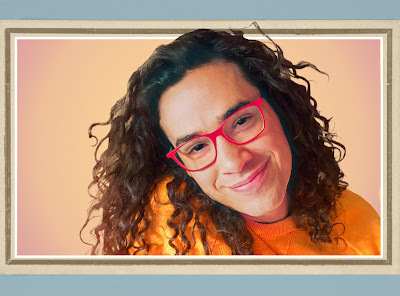
Jake Brasch
Hometown: Denver, CO
Current Town: New York, New York
Q: What are you working on now?
A: This morning I cleaned the freezer. It was the most difficult project I’ve taken on in quite some time. A haunting expedition into the land of questionable past choices. Impossible to chart the dramaturgy of the thing. Harrowing.
Pre-freezer, I’ve been spending the bulk of the Spring hacking away at three pieces: I’ve been working on OUR TEMPEST with The Farm Theater’s College Collaboration Project. It’s a piece about Climate Change, queerness, and the perils of devised theatre. I’ve also been developing THE RESERVOIR with the EST/Sloan project, a super personal piece about Alzheimer’s disease, addiction, and what, if anything, we can do to prevent or recover memory loss. I just completed and shared the first draft of SPIN, a play I wrote with the Arthouse INKubator group. It’s a kaleidoscopic piece about reincarnated owls, birthday party clowns, the scarcity mentality, and Jewish mysticism.
I’m currently chewing on a nascent idea for a play that is about Bernie Sanders and apricot farming.
Q: Tell me, if you will, a story from your childhood that explains who you are as a writer or as a person.
A: At four years old, I staged a 90 minute “Oklahoma!” on my rocking horse. I wore a cowboy hat and Barney underwear, nothing else. My grandma played Aunt Eller, but I played the rest of the characters. You should have seen my one person dream ballet; I went so hard I broke a lamp. My parents filmed the whole thing and at several points you can hear them trying to rush me along, especially during a painfully under-tempo “Poor Jud is Dead.” I stubbornly persevered.
My auntie says I was born a 40-year-old gay man. My AOL Instant Messenger username was NathanLaneRules. Embarrassing beyond belief, but explains a lot.
Q: What kind of theater excites you?
A: I love theatre that scrambles you, that doesn’t allow itself to be classified, that has you laughing and crying and shaking your head in disbelief. I want to be surprised. I want real risk. I want plays to be journeys into the unknown rather than thesis statements. I want playwrights to build exquisitely weird structures that miraculously work. I want questions rather than answers. I want pain, humor, and heart all at once.
Q: What advice do you have for playwrights just starting out?
A: Write. Don’t be precious. Write a bunch of bad plays. Write your way into your voice; don’t try to think your way into it– it won’t work. Focus on language, not ideas. Follow the flow. Surprise yourself. Make yourself laugh. Let the play sneak up on you.
Invite people to your apartment to hear a play you haven’t written yet. Lose your mind trying to write the play. Almost cancel the play reading several times. Miraculously finish a draft. Become painfully unsure of said draft. Share it anyway. Hear what you’ve written. Feel seen. Repeat.
Write write write stop reading this and write.
Q: Plugs, please:
A: Have you tried Angie’s Boom Chicka Pop Kettle Corn??? I am in no way affiliated, but it’s so unbelievably good so here’s a huge plug for the snack to rule all snacks. It’s in a purple bag and at most grocery stores. Best advice I can give.
I share work often in NYC, especially with Youngblood at the Ensemble Studio Theatre and The Farm Theater. For the next couple years, I’ll have a chance to share work at Juilliard as well!
For up to date plugs, you can visit jakebrasch.com. To read my plays (and then produce them!) you can visit https://newplayexchange.org/users/36675/jake-brasch.
---------------------------------------------------------------------------------------------------------
Enter Your Email To Have New Blog Posts Sent To You
-----------------------------------------------------------------------------------------------------------
Support The Blog
 -----------------------------------------------------------------------------------------------------------
-----------------------------------------------------------------------------------------------------------Mailing list to be invited to Adam's events Email: ------------------------------------------------------------------------------------------------------------Adam's Patreon
Adam's New Play Exchange Profile (Plays to Read)
Books by Adam (Amazon)
Published on June 08, 2022 07:33
May 22, 2022
I Interview Playwrights Part 1111: Nia Akilah Robinson
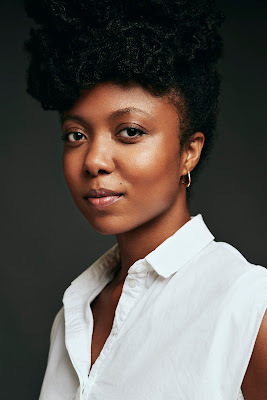
Nia Akilah Robinson
Hometown: Harlem, NYC.
Current Town: Harlem, NYC.
Q: What are you working on now?
A: A play surrounding Black History Month in a New Jersey High School.
Q: Tell me, if you will, a story from your childhood that explains who you are as a writer or as a person.
A: Dancing with my parents. I will never forget it. I have to keep up with them (even still).
Q: If you could change one thing about theater, what would it be?
A: Community events inspired by the show… While the show is in production?
Q: Who are or were your theatrical heroes?
A: Currently (as of May-2022) & for vastly different (specifically personal) reasons.
Keith David
Robbie McCauley
Beah Richards
Tanya Saracho
Kit Yan
David Henry Hwang
Lee Sunday Evans
Zainab Jah
My Parents
Q: What kind of theater excites you?
A: for us to fill out.
------- theater in which------we hope----____________ gets--------to experience------____________
Q: What advice do you have for playwrights just starting out?
A:
-there’s always something happening.
-if you can/ explore new landscapes.
-you are brave, new playwright.
Maybe (after research/ consideration) join a writer’s group (or ten)?!
Maybe (after research/ consideration) create a writer’s group (or ten)?!
Q: Plugs, please:
A: Please listen to my EST Youngblood podcast episode of Ebony & Nakeshia!
---------------------------------------------------------------------------------------------------------
Enter Your Email To Have New Blog Posts Sent To You
-----------------------------------------------------------------------------------------------------------
Support The Blog

-----------------------------------------------------------------------------------------------------------
Mailing list to be invited to Adam's events
Email:
------------------------------------------------------------------------------------------------------------
Adam's Patreon
Adam's New Play Exchange Profile (Plays to Read)
Books by Adam (Amazon)






Published on May 22, 2022 06:31
April 12, 2022
I Interview Playwrights Part 1110: Steve Harper

Steve Harper
Hometown: I was born in Brooklyn, NY. And we lived there (in Fort Greene) until I was 5. I grew up on Long Island.
Current Town: I currently live in Inglewood, CA - which is just outside of the city of Los Angeles (and in Los Angeles county). It’s where the Super Bowl was this year.
Q: What are you working on now?
A: I’m working on few things (I’m always juggling a few things). Several years ago, I collaborated on a piece (two monologues) - I wrote one - about police profiling black people. The play is called Black Lives / Blue Lives. I kept writing and now my monologue has morphed into several others (based on interviews) with police officers and black people (and black police officers). So, now there’s an entirely new piece comprised of the new monologues. The play doesn’t have a name yet. It’s fascinating to dive into this kind of intersectionality on an issue like this. I’m excited to see how it develops and how it lands on audiences. I’m also working on a new (original) piece for TV that I can’t really talk about yet. I’m developing a few other TV things that will hopefully see the light of day. And there are a few plays that are waiting in the wings, haunting me.
Q: Tell me, if you will, a story from your childhood that explains who you are as a writer or as a person.
A: I went to Catholic school as a kid - my father was Catholic and we were raised that way even though my mother was Episcopalian but never went to church. Mom was (and is) obsessed with true crime and serial killers as well as horror novels (Stephen King was her favorite). So I was always fascinated by the notion of what was lurking around the corner - things / beings / entities we could see and things we couldn’t see. I zeroed in on what I call the invisible things. And today, I write about those things (sometimes there are ghosts and spirits in my work, sometimes it’s about race or sexuality or politics or religion). At one point, maybe in 4th grade, I went through this period where I was always telling on my older brother when he did something a bit sketchy (my brother had a rebellious streak and I was a rule follower). At the time I thought I was saving his soul, though I was really just annoying him. (And he stopped hanging out with me because of it). But I think it was also me trying to be transparent - to tell the truth about what was happening. I’m still trying to do that - tell the truth about stuff - in what I write. (Hopefully the results are entertaining and not as annoying as I was in 4th grade.)
Q: If you could change one thing about theater, what would it be?
A: More diverse storytelling and more opportunities! I was an actor before I was a writer, and I remember being in acting class and trying to find scenes with parts that I would actually get cast in. But we were doing all those “classics”: O’Neill, Miller, Williams, Chekov. Solid plays, but not a black person in sight. We still recycle those classics - and it makes American theater more challenging for students of color and professional actors trying to make a living. That’s one of the reasons I wanted to put out an anthology of short plays - to give those actors and artists some fresh material with diverse characters. It is much better now thanks to some amazing playwrights of color, but it’s not solved. It’s still pretty easy to find those classics recycled and new plays by white writers with few diverse roles. And, as a black playwright, there are only so many opportunities. A theater may have one person of color slot - so we all have to fight to get that one slot. And we’re fighting with the talented prominent black writers. One slot and they have to choose among Lynn Nottage, August Wilson, Dominique Morriseau and lesser known writers (like me). It’s challenging to find those opportunities.
Q: Who are or were your theatrical heroes?
A: I think Lynn Nottage is amazing. Her plays are so visceral and moving. And they are so different. I’m a big fan of Angels In America - Tony Kushner has so much going on in his work. There are a handful of writers: Lorraine Hansberry, Katori Hall, Richard Greenberg, John Guare, Suzan-Lori Parks, Tarrell Alvin McCraney, Charles Fuller (who is a cousin on my mother’s side). I met James Baldwin when I was in college (I was in a production of his play The Amen Corner). I didn’t know that much of his work then, except that play, but read a ton of his writing later - and it floored me.
Q: What kind of theater excites you?
A: I like theater that makes me feel something. And makes me think deeply about my life. I grew up watching so many kitchen sink plays - and I dig the realism, but I want to have some magic, too. And people of color. And furniture. I’m not a fan of plays where the director takes all the furniture out and makes the actors mime things and imagine the world around them. I want to see walls!! Nothing too abstract and heady. I want to SEE the world and the people and get the resonance when they bump up against each other. I guess I enjoy seeing American homes - the ones that have people of color in them. I’m a fan of plays that feel like they’re happening in someone’s living room and you’re just eaves dropping on their joy and their agony.
Q: What advice do you have for playwrights just starting out?
A: Find your peeps. Make stuff. Don’t wait for people to put on your plays. Do it yourself. The system is broken. You’ll repair it by giving yourself permission to reinvent. And be gentle with yourself and each other. Find ways to nurture yourself. Everything happens little by little and there’s only one you. And then - teach. Anything you learn is something that you can pass on.
Q: Plugs, please:
A: My new anthology: A Few Short Plays to Save the World is coming out (May 1st) published by Laughing Panda Press (and available all over). My two-monologue play: Black Lives / Blue Lives (written with Bill Mesce Jr.) is being presented by The Theater Project in New Jersey for community groups and schools. My play Urban Rabbit Chronicles will receive its world premiere at Georgia Southern University April 20th - 24th.
---------------------------------------------------------------------------------------------------------
Enter Your Email To Have New Blog Posts Sent To You
-----------------------------------------------------------------------------------------------------------
Support The Blog

-----------------------------------------------------------------------------------------------------------
Mailing list to be invited to Adam's events
Email:
------------------------------------------------------------------------------------------------------------
Adam's Patreon
Adam's New Play Exchange Profile (Plays to Read)
Books by Adam (Amazon)






Published on April 12, 2022 10:59
February 4, 2022
I Interview Playwrights Part 1109: Talene Monahon
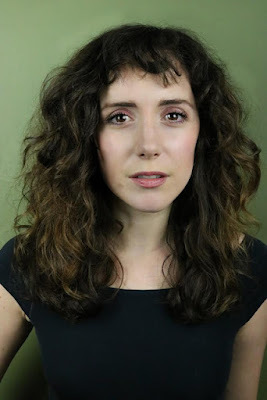
Talene Monahon
Hometown: Belmont, MA.
Current Town: Brooklyn, NY.
Q: Tell me about Jane Anger:
A: I call it a Jacobean feminist revenge farce. I wrote it early on in the pandemic when everything was fully shut down and I had returned home to Massachusetts to nanny my sister’s children. I think the play is very much the product of full-on pandemic brain—both in that it is literally set during a plague outbreak and in that it is generally insane. At the time, I was reading Jacobean revenge tragedies and watching a lot of Monty Python. I became strangely interested in merging the genres and centering women a little more than is usually done in either. I don’t want to give too much away. The play is about some real people and also some people I’ve made up. There’s a lot of true history in there and also a flagrant disregard for historical fact. There’s a bit about a sticky pudding that is truly disgusting.
Q: What else are you working on now?
A: I have a play called The Good John Proctor about the girls from The Crucible that is in development and will be presented as part of Bedlam Theater Company’s Spring Reading Series. I’m also working on a piece that traces the Armenian American community’s relationship to whiteness over the course of the twentieth century, starting right after the genocide and leading up the Kardashians.
Q: Tell me, if you will, a story from your childhood that explains who you are as a writer or as a person.
A: When I was a child, I made up a ghost story about a slaughtered cat who haunted the electrical shack a little way down the street. I told this story to my friends in an attempt to be spooky and interesting. Unfortunately, as the weeks went on, I grew to believe the story that I had fabricated from my brain. I became very frightened of the electrical shack and worried that the bloody cat ghost would snatch me as I walked past it. I dealt with this fear for years. I guess this set me up for a life in the theater because I love to believe my own lies.
Q: If you could change one thing about theater, what would it be?
A: Accessibility, baby! There are a lot of things that need to change in order to make theater more accessible—both to artists and audiences. Maybe I should have gone big and said capitalism.
Q: Who are or were your theatrical heroes?
A:Annie Baker.
Jackie Sibblies Drury.
Anna Deavere Smith.
Liza Birkenmeier.
Michael Friedman.
Anton Chekhov!
Q: What kind of theater excites you?
A: I love plays that are rousing and mysterious. I like feeling like the audience I’m a part of has become a cute little cult. I’m very happy watching theater that doesn’t have an easy explanation—like, how did she sing that high note? Or, what was that weird noise? Or, what was the playwright’s overall message? We have no idea! I love to see it.
Q: What advice do you have for playwrights just starting out?
A: Find smart collaborators whom you trust and then embrace it when they have the better idea. My work has always grown stronger through collaboration.
Q: Plugs, please:
A: The Lamentable Comedie of Jane Anger, That Cunning Woman. And Also of Willy Shakefpeare and his Peasant Companion Francis, Yes and Also of Anne Hathaway (also a Woman) Who Tried Very Hard starts performances February 21st at the New Ohio. Tickets and more info here:
https://www.janeangerplay.com/jane-anger
---------------------------------------------------------------------------------------------------------
Enter Your Email To Have New Blog Posts Sent To You
-----------------------------------------------------------------------------------------------------------
Support The Blog

-----------------------------------------------------------------------------------------------------------
Mailing list to be invited to Adam's events
Email:
------------------------------------------------------------------------------------------------------------
Adam's Patreon
Adam's New Play Exchange Profile (Plays to Read)
Books by Adam (Amazon)






Published on February 04, 2022 06:08
January 14, 2022
I Interview Playwrights Part 1108: Dave Osmundsen
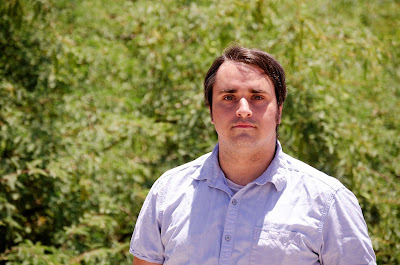
Dave Osmundsen
Hometown: Pompton Plains, NJ
Current Town: Pompton Plains, NJ (by way of Sarasota, FL and Tempe, AZ)
Q: What are you working on now?
A: I’m working on a few projects (including prepping for the world premiere of my play Light Switch), but one work-in-progress I’m particularly excited about is an adaptation of Autism awareness advocate Michael John Carley’s article The Brat in Your Classroom. The article depicts his tumultuous years at a private school called Moses Brown, and how he emotionally processes those years in the wake of receiving an Autism diagnosis in his mid-thirties. It’s still in early stages, but I’m really excited for people to (eventually) see it!
Q: Tell me, if you will, a story from your childhood that explains who you are as a writer or as a person.
A: In my backyard, I would stand between two trees and pretend I was on a stage. Or I would make myself a minimalist set with a few chairs on the backyard patio (my “second stage,” if you will). Armed with two sticks (which I would bang together to make percussive sounds), I would sing made-up lyrics to musical theatre melodies I knew. I would act out musicals with plots that fused derivatizations of other musicals with my own contributions—a musical that was vaguely about a gay rights activist with a score lifted directly from Evita, an Into the Woods-style musical featuring an assortment of Bible characters (and a Devil Giant who embarked on a murderous spree in Act Two), a Wicked-like story about a gay teenager whose jealous emotions literally overtake him, to name a few. I would never get through a whole show, but rather repeat my favorite musical moments and/or songs. There was no audience because there didn’t need to be one. I was my own audience. Just when I was getting lost in the music and the stories, my sister would scream from her bedroom window “DAVID STOP SINGING.” And I would stop. Then I would tap the two sticks together, quietly, gently, and ease myself back into the musical world I had created for myself.
Q: If you could change one thing about theater, what would it be?
A: Just one thing??? Aside from the usual wishes that it was cheaper and more accessible, I would change the perception of neurodivergent artists. There seems to be some astonishment and bewilderment that neurodivergent artists can tell their own stories from their own perspectives. Why is this? Why can’t there be an assumption of competence? Why does autism specifically (since that is my neurodivergence) have to be portrayed solely as “Inspirational”? Why can’t it be treated with complexity and nuance? Why does it always have to be the neurotypical playwrights who tell neurodivergent stories? Why is Curious Incident of the Dog in the Night-Time, a play that doesn’t even mention the word “autism,” the most famous example of neurodivergent theatre? I would change all that.
Q: Who are or were your theatrical heroes?
A: Amy Herzog, for her ability to take messy situations and add beauty and clarity to them.
David Lindsay-Abaire, for his sharp observations about humanity, even in the most absurd of his plays.
Mickey Rowe, for fearlessly working and living as an autistic artist.
Paula Vogel, whose generosity in mentoring young artists is legion.
Larry Kramer, whose activism inspires me to be more politically aware and active in my work and life.
Patti LuPone, for never bullshitting.
Q: What kind of theater excites you?
A: Theatre that complicates. Theatre that is tight. Theatre that is grand. Theatre that expands. Theatre that runs. Theatre that fucks. Theatre that caresses. Theatre that leaves you shooketh. Theatre that moves you to make your life, or someone else’s life, or the world’s life better. Theatre that makes you laugh in hysterics in the midst of devastating heartbreak. Theatre that is a well-executed well-made play. Theatre that splatters on the living room wall. Theatre that is messy and elegant at once. Theatre that, for its brief duration, lives.
Q: What advice do you have for playwrights just starting out?
A: If you’re a fan of an artist and you find yourself in the same space as them, thank them for their work.
If an artistic director or literary manager or fellow artist you’ve reached out to never replies, that says more about them than it does about you.
Find your people. Whether they be playwrights, designers, actors, administrators, what have you, find the people who get your work and want to see it succeed.
That being said, no one will be a better advocate for your work than you. So if you wrote a play, and you believe in what it’s saying, don’t be afraid to put it out there.
This quote comes to mind: “Those who mind don’t matter, and those who matter don’t mind.”
Q: Plugs, please:
A: My play Light Switch will be receiving its world premiere from Spectrum Theatre Ensemble in Providence, Rhode Island this coming April. Watch this site for more info: https://www.stensemble.org/
The Gift of BS will receive a virtual reading during the Clay & Water Playwrights Retreat the weekend of February 24—27. Watch this site for more info: http://www.clamourtheatre.org/events/2022-2/clay-and-water-2022/
The Dummy Class will receive a workshop reading with Purple Crayon’s PLAYground Festival of Fresh Works the weekend of April 30—May 1.
If you’re interested in learning more about Light Switch and neurodivergent theatre, I’ve developed a course through theatre.university: https://www.theatre.university/courses/neurodivergent-theatre-light-switch/
Read some Actually Neurodivergent playwrights! A few playwright/play recommendations you can find on the New Play Exchange are Hayley St. James (For Leonora or Companions), Schereeya Reed (End of the Line), and Scott Sickles (Seaside Tragedies)
---------------------------------------------------------------------------------------------------------
Enter Your Email To Have New Blog Posts Sent To You
-----------------------------------------------------------------------------------------------------------
Support The Blog

-----------------------------------------------------------------------------------------------------------
Mailing list to be invited to Adam's events
Email:
------------------------------------------------------------------------------------------------------------
Adam's Patreon
Adam's New Play Exchange Profile (Plays to Read)
Books by Adam (Amazon)






Published on January 14, 2022 10:45

